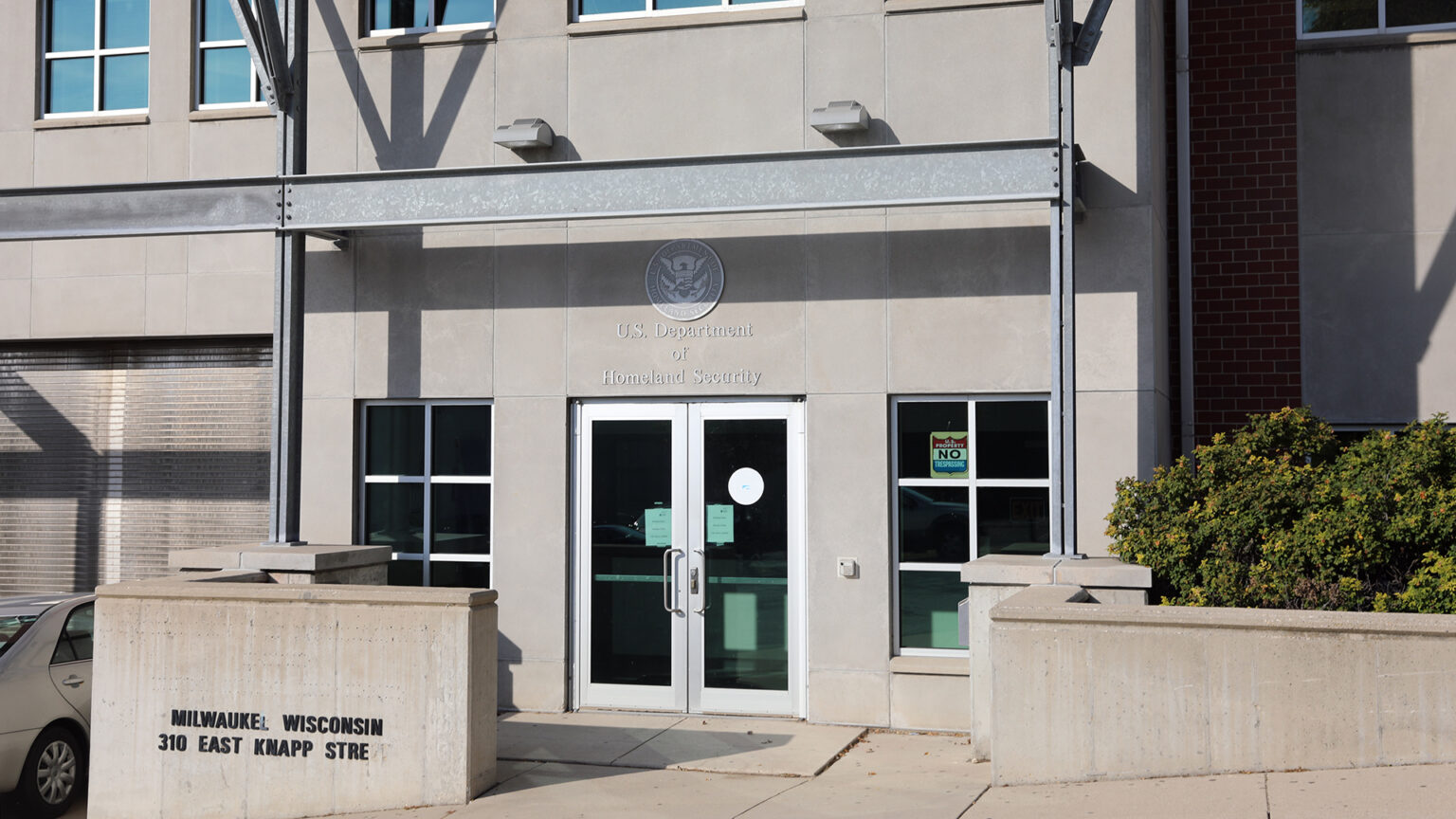Arrests of asylum seekers in Milwaukee show shifting tactics by ICE agents
A Venezuelan couple arrested during a routine immigration check at an Immigration and Customs Enforcement office in Milwaukee will try to continue their asylum cases while detained hundreds of miles away from each other.
Wisconsin Watch
October 31, 2025

A building at 310 E. Knapp St. in Milwaukee that's owned by Milwaukee School of Engineering and rented by the Department of Homeland Security to serve as a U.S. Immigration and Customs Enforcement field office is seen on Oct. 28, 2025. (Credit: Paul Kiefer / Wisconsin Watch)

This story was produced and originally published by Wisconsin Watch, a nonprofit, nonpartisan newsroom.
A Venezuelan couple arrested Oct. 23 during a routine check-in at U.S. Immigration and Customs Enforcement’s downtown Milwaukee office are attempting to continue their asylum cases while detained — one in ICE’s Dodge County detention facility and the other in a Kentucky facility.
The arrests reflect an apparent shift in ICE’s interpretation of protections for asylum seekers, posing new risks for those waiting for immigration officials to hear their cases.
Diego Ugarte-Arenas and Dailin Pacheco-Acosta fled Venezuela in 2021, crossing the border at Eagle Pass, Texas, by November of that year and encountering border patrol officers, according to an ICE spokesperson. Hundreds of thousands of Venezuelans have made the same journey in the last decade, of whom at least 5,000 have settled in Wisconsin.
Milwaukee immigration attorney Ben Crouse, who took on the couple’s case after they were detained, told Wisconsin Watch that border patrol officers initially provided Ugarte-Arenas and Pacheco-Acosta with notices to appear in immigration court. Critically, those notices didn’t provide a date or time for their future hearing, preventing the immigration court system from opening removal cases against them.
The Department of Homeland Security (DHS) at that time routinely issued notices to appear without specifying a hearing date, Crouse said, despite multiple U.S. Supreme Court rulings underscoring that notices must specify a time and date.
“There was a lag time between the Supreme Court saying they had to have times and dates on the notice to appear and DHS actually communicating with (the Department of) Justice to put things on calendars,” Crouse noted.
The couple then made their way to Wisconsin and filed for asylum, a legal protection from deportation for immigrants fleeing persecution. Their joint application cited their involvement in the political opposition to Venezuelan President Nicolas Maduro as grounds for asylum, Crouse said.
Immigrants can take two paths to claim asylum in the U.S.
Ugarte-Arenas and Pacheco-Acosta filed for “affirmative” asylum, managed by U.S. Citizenship and Immigration Services (USCIS) and generally open only to those without removal cases before an immigration court. Without complete notices to appear, Crouse noted, the couple’s cases had not yet reached the court, opening the door to this pathway.
Immigrants with open removal cases apply for “defensive” asylum with an immigration court judge.
At least 100 immigrants with Wisconsin addresses have entered the defensive asylum process between January 2020 and August 2025, court records show. Most came from Nicaragua, Colombia and Venezuela. Between 2019 and 2024, immigration court judges in Chicago — the court with jurisdiction over most Wisconsin cases — denied roughly 40% of asylum petitions, according to data collected by the nonprofit Transactional Records Access Clearinghouse.
Under the Biden administration, immigration authorities began correcting incomplete notices to appear, enabling them to move asylum applications from the affirmative process to the defensive process. That swap rarely landed asylum seekers in detention, Crouse said.
Ugarte-Arenas’ and Pacheco-Acosta’s arrests are part of a broader shift in ICE’s attitude toward asylum. Multiple Milwaukee-area immigration attorneys say the agency is now detaining immigrants after terminating their affirmative asylum case.
An ICE spokesperson did not respond to Wisconsin Watch’s questions about its new approach.
“ICE does not ‘randomly’ arrest illegal aliens,” the spokesperson wrote in an email. “Being in the United States illegal (sic) is a violation of federal law. All aliens who remain in the U.S. without a lawful immigration status may be subject to arrest and removal.”
The couple is now pursuing the defensive asylum process while separated by hundreds of miles. In September, DOJ’s Board of Immigration Appeals, which can set rules for federal immigration courts, ruled that immigrants in ICE custody who entered the country “without inspection” are ineligible for release on bond. The decision mirrors an argument that the Department of Homeland Security has made in immigration courts nationwide since July.
Navigating the asylum process from ICE detention is logistically difficult, Crouse noted. Scheduling a brief phone call can take days, he said, and attorneys must rely on faraway sheriffs’ offices to ferry paperwork to and from their clients.
“Tiny little things take days to fix,” he added.
ICE’s shifting approach to asylum is not limited to affirmative cases.
In recent months, the agency has also begun filing motions to dismiss the immigration court cases of defensive asylum seekers, said Milwaukee immigration attorney Marc Christopher. Once the immigrants’ cases are dismissed, ICE can place them in “expedited removal” proceedings — a fast-moving process that does not require a hearing.
In some cases, Christopher said, “they dismiss a case in court and ICE is waiting right outside. Or they wait until they come to a check-in and arrest them there.”
ICE agents arrested roughly 75 immigrants at or near its Milwaukee office between January and July of 2025, more than at any other Wisconsin site listed in agency arrest records during the period. Most of those arrested at the office, including Ugarte-Arenas and Pacheco-Acosta, had neither a past criminal conviction nor a pending criminal charge.
The Milwaukee office also includes a “holding room” in which an average of six people were detained at a time as of June, according to Vera Institute of Justice data.
DHS recently extended its lease on the property, which is owned by the Milwaukee School of Engineering, until April 2026, with options to retain the space until 2028. ICE has been preparing to open a new office on Milwaukee’s northwest side in the fall of 2025.
![]()
 Passport
Passport











Follow Us